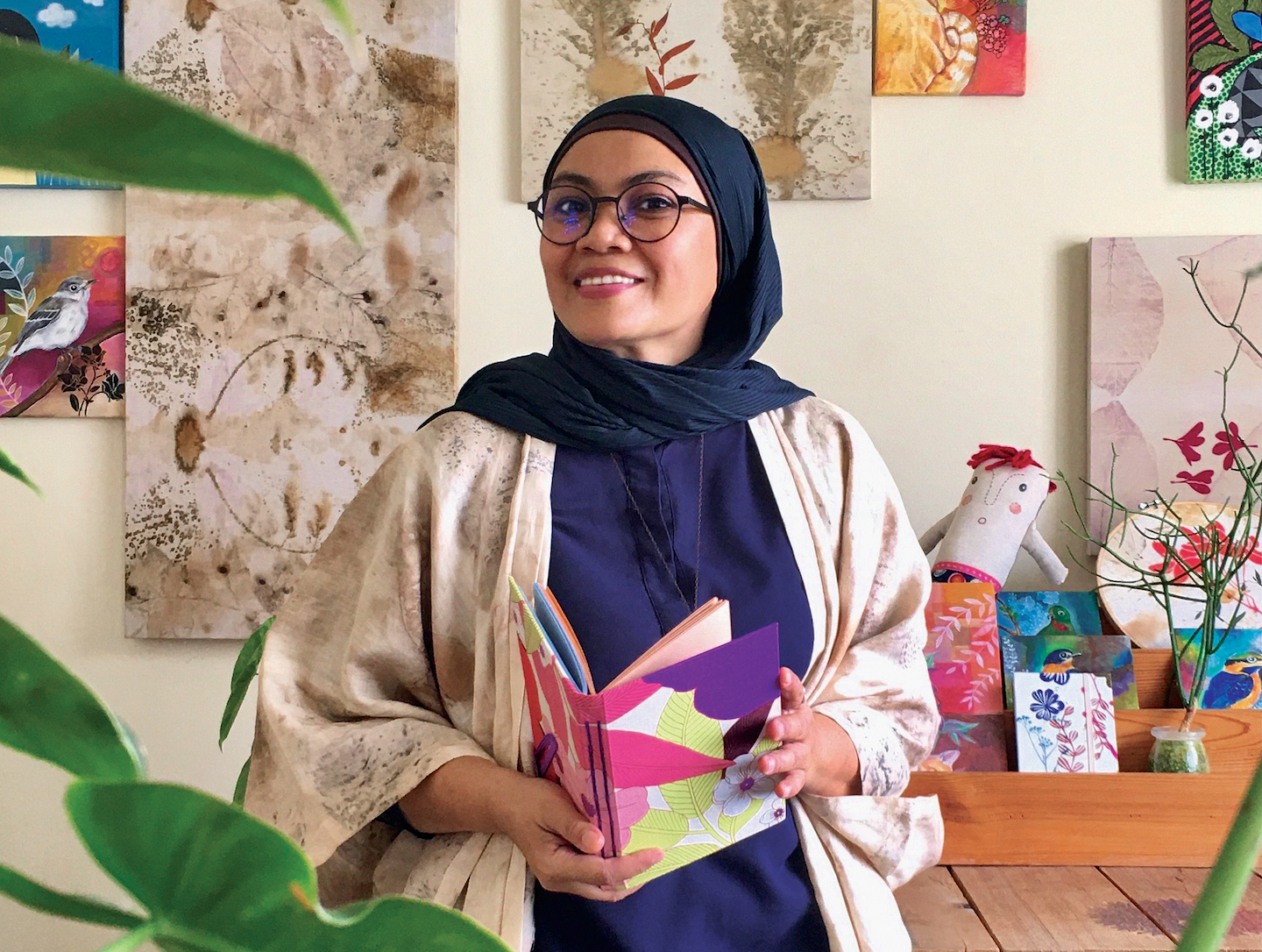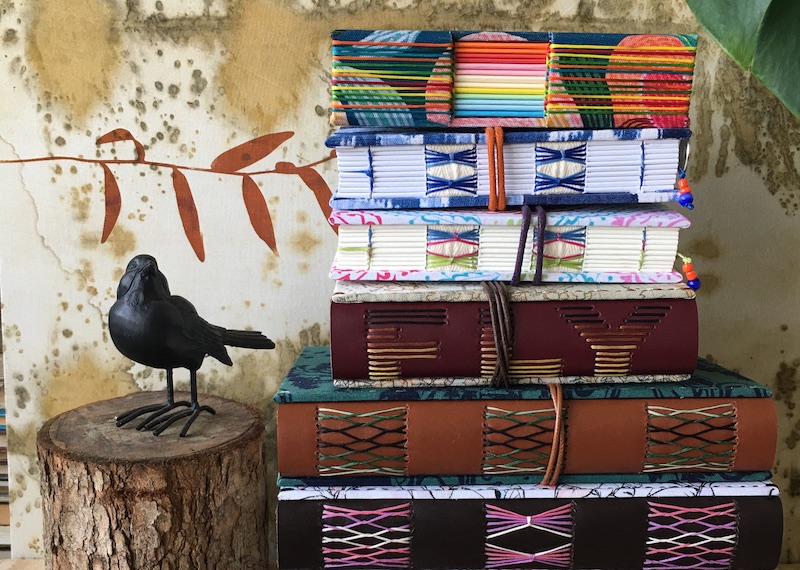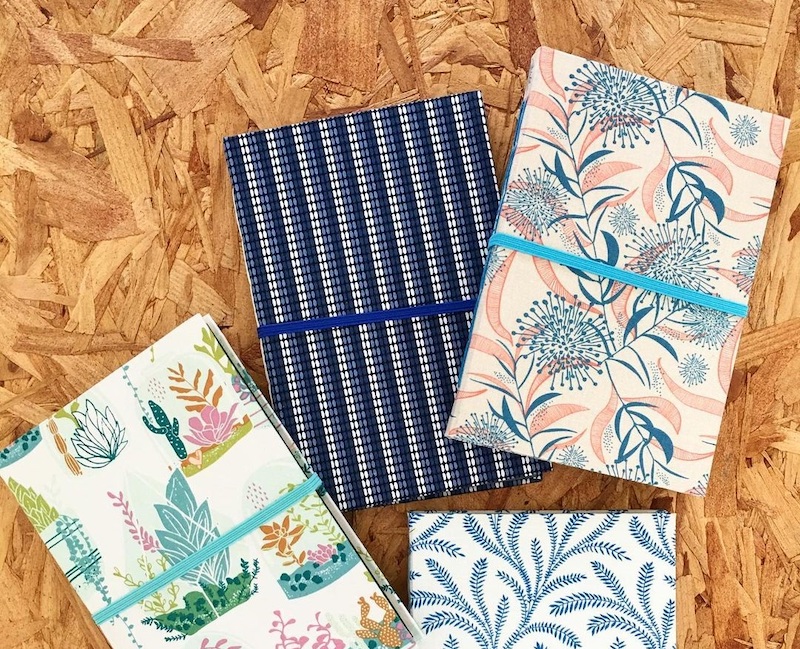
Founder Samsiah Jendol left her corporate life to set up Little Syam (All photos: Samsiah Jendol)
Books are not just books to me,” says Samsiah Jendol, founder of Little Syam. Prior to leaving corporate life, she worked in many different roles, including that of design manager and head of design. Always interested in arts and crafts, making books of her own is just one of Samsiah’s many passions.
“I decided before turning 40 that I did not want to work for people anymore. I wanted to make crafts with my own hands. I still apply what I learnt from my discipline, but in a different way.” In 2010, she made the decision to pursue her passion in the book-binding business, which would allow her to marry functionality with aesthetics.
Samsiah’s obsession with fabric is paramount and she loves the fact that she can make any pattern or design using different printing methods she has acquired in her journey. “I have learnt batik canting, eco printing, silkscreen printing, cyanotype printing and used those skills to make book covers,” she says. As a lover of nature, she is inclined towards motifs inspired by leaves, flowers and animals.
She also uses ready-made fabrics that she buys from all over the world during trips overseas. Her favourite place to shop has always been the Melbourne-based business Spotlight, as it has many selections of quality materials from international designers.
img-2199.jpg

“Many years ago, Spotlight was not available in Malaysia. So, whenever I travelled to New Zealand or Australia, I would always come back with a chunk of fabric I bought from the store. When the shop finally opened in our country, I was the happiest person,” she recalls. She also buys batik from local sellers.
As for paper, Samsiah opts for FSC-certified paper — environmentally friendly and of good quality — manufactured in Europe as it aligns with her goal of being an eco-conscious brand.
A cheerful yet sentimental individual, Samsiah still has the book she created in university for an assignment 20 years ago that sparked her interest in this underappreciated craft. “The lecturer taught us three ancient techniques — coptic stitch, kettle stitch and Japanese binding. Now, I have mastered close to 20 types of stitches. As long as you know the basics, you can use your creativity to do complex and elaborate stitches.”
Apart from having an online presence, Little Syam occasionally participates in artistic bazaars or festive markets. It has also been approached by book and souvenirs stores across the country, especially in tourist destinations such as Langkawi, Penang, Sabah and Sarawak.
Samsiah usually prepares an order of 20 books per production to be sent to those stores. The whole process of making the books takes two to three days to complete. “I start by folding sheets of paper before punching holes in them. Next is stitching, which is the most demanding stage, as some techniques require more time than others. Lastly, I attach the covers to all the books.”
266820731_261274612581124_1473600488710577681_n.jpg

In addition to custom-made books, Little Syam offers a book restoration service to give new life to damaged books. “Customers tend to restore the book cover because it usually wears out first. I maintain the original design of the cover or change it to a brand new look altogether, depending on the request — this is where my knowledge and skills in printing, as well as graphic design, are important. I’ve fixed copies of the Quran, comics and novels — sometimes, customers wish to change their soft book covers to hard ones. It gives me satisfaction knowing I am able to prolong the lives of these books.”
A year after the brand started, Samsiah began organising workshops and was invited by companies to share her knowledge in book-binding. She also runs workshops from her studio in Titiwangsa, Kuala Lumpur which has been her second home for the past seven years. To date, she has had more than 2,000 students. People participate in her workshops for various reasons — some use their free time to learn new skills while others just want to spend time meaningfully with their loved ones.
“When I teach, I aim to duplicate another me. I provide them with the skills, so they can do whatever they want with the knowledge. I met one of my attendees in New Zealand, who had come all the way to Malaysia to attend my workshop. Now, she is selling customised books in France.”
Malaysians are still behind when it comes to appreciating book restoration. Samsiah is not spared questions about artisans charging a certain amount of money for their services. “I will tell them the price first. If they agree, we will proceed. If they don’t, it’s fine because I don’t like to bargain over the value of my skills. Although I’m not running this enterprise for money, I am a business owner and it is still my bread and butter. The charges I impose cover the materials I use and the time I spend,” says Samsiah.
After quitting a comfortable job, she had doubts as to whether she could sustain her livelihood with this atypical venture. Fortunately, by the time she set up Little Syam, handmade businesses were beginning to have a place in the country. “Now, I can put my worries to sleep because I am lucky enough to have customers who keep coming back for my services.”
Samsiah contemplated changing Little Syam a couple of times, but stuck with it as she believes branding is more than the name itself. It is also about her work and the skills she represents. “Syam comes from the name my parents used to call me. Little indicates that my business is small-scale, yet it is well equipped with everything personal that seems tiny — but can be big, depending on how people see it.”
This article first appeared on Apr 4, 2022 in The Edge Malaysia.


